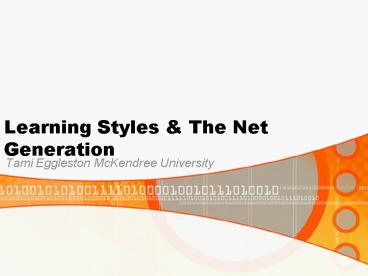Learning Styles PowerPoint PPT Presentation
1 / 16
Title: Learning Styles
1
Learning Styles The Net Generation
- Tami Eggleston McKendree University
2
- Learning and Cognitive Styles..
Take a moment to think about the ways that you
PREFER to learn new things..
3
Basic Learning Styles Barsch, 1980
- Auditoryremember best information they hear and
discuss (like to talk, laugh, tell stories) - Visualneed a mental model, image, or picture to
learn (pictures, encourage drawing, graphs) - Kinestheticlearn best through movement and
touching (hands on activities, move around class) - If you are having trouble with your computer
- A-call for help,V-Look for diagrams,K-trial/error
- VARK (added read/write) Survey
4
- Visualimage or picture (pictures, encourage
drawing, graphs)
- Auditoryhear and discuss
- (like to talk, laugh, tell stories)
- Read/Write
- Kinestheticmovement and touching (hands on)
5
Raise your hand if..
1.) You like to see pictures and diagrams when
you learn 2.) You find too many pictures and
graphics distracting 3.) You enjoy studying with
music on in the background 4.) You can get
distracted in class if too many people are
talking 5.) You learn best just by reading and
taking notes 6.) If you have to sit in a lecture
and just take notes for too long you get
bored 7.) You love to get up and move into
groups during class 8.) You dont like to move
around much and prefer to sit in the same spot
6
Cognitive Styles Entwistle, 1981
- Conceptual Tempo
- refers to the speed of decision making
- Impulsivity-work and make decisions quickly
- Reflectivitytake longer to consider all
alternatives
7
Learning Styles Kolb, 1984
- 1.) Convergers/Pragmatistsreach closure
quickly, find concrete solutions - 2.) Divergers/Reflectorsawareness of meaning
and values and enjoy brainstorming and
alternative solutions - 3.) Assimilators/Theoriststake in lots of
information and build theoretical models based on
the info - 4.) Accommodators/Activistsaction-oriented,
take risks, and teach themselves through trial
and error
8
Gardner Multiple Intelligences
- 1.) Logical/mathematical (numbers, reasoning)
- 2.) Verbal/Linguistic (words, language)
- 3.) Musical
- 4.) Spatial (perceptions, transformations)
- 5.) Bodily/Kinesthetic (body movements, handle
objects skillfully) - 6.) Interpersonal (respond to others)
- 7.) Intrapersonal (self-knowledge)
- 8.) Naturalist (environment, outdoors)
9
(No Transcript)
10
Generative Learning Discovery Learning
- Generative Learning is a theory that emphasizes
the active integration of new material with
existing schemas-let students make their own
questions, summaries, and analogies - Discovery learning include methods in which
students are encouraged to discover the
principles for themselves
11
Net Generation
- Baby Boomers 1946-1964
- Generation X 1965-1982
- Net Generation 1982-1991
- By the time the Net Generation is 21
- 10,000 hours playing video games
- 200,000 emails
- 20,000 hours watching TV
- 10,000 hours on cell phones
- under 5,000 reading (Bonamici, 2005)
12
Net Gen goes to college.
- 97.8 percent own computers
- 38.3 percent started college with laptop and
desktop - 98.8 percent use to compose coursework
- 70.6 percent use Web recreationally
- 73.4 percent play games
- 99.9 percent create, read and send e-mail
- More than 80 percent use IM daily
- Facebook, a college networking site, counts 16
million users (and growing!) ECAR, 2006
13
The Net Generation.
- 1.) When you compose a paper do you start on the
computer or paper? - 2.) Have you turned your remembering (e.g.,
phone numbers, meetings, etc.) to technology? - 3.) Are you constantly connected (phone, IM,
internet?) - 4.) How many activities can you effectively
engage in at one time? - 5.) Do you play video or computer games?
14
Net Generation
- Information age mindset
- Digital Natives
- Milliennials
- Net generation tends to be goal-oriented,
cautious, pragmatic, and wants to be engaged with
the content - Learning Styles Influences
- Phones, Gaming, IM, Virtual environments (sims)
- Social Networking (Facebook, Myspace, Youtube)
- Multitasking, searching for information, quick
decisions, scanning (rather than reading) - 83 engage in service learning
- Helicopter Parents
15
The Net Generation Goes to College
- Howe and Strauss found the Net Generation
- 1.) Gravitates toward group activity
- 2.) Are fascinated by new technologies
- 3.) Are focused on grades and performance
- 4.) Are busy with extracurricular activities
- 5.) Prefer inductive discoverylearn better
through discovery than being told - 6.) Multitask
- 7.) Have fast response and decision making times
- 8.) Expect immediate feedback (The Net Gen is
fast) - 9.) Tend to be visual and kinesthetic (less
text) - 10.) Are used to cut and pasting and cheating
needs to be defined
16
Combing Learning Styles, Technology,and the Net
Gen
- Driven (CMS, organization, multiple points, clear
grading) - Creators (Discovery learning)
- Service-minded (add real world activities)
- Multi-taskers (can do multiple things at one
timeplay music, short video clips, groups) - Technology users (CMS, IPODS, Youtube, internet,
etc.) - Social creatures (Facebook, group work)
- Increasingly Mobile (phones, IPODS, wireless)

